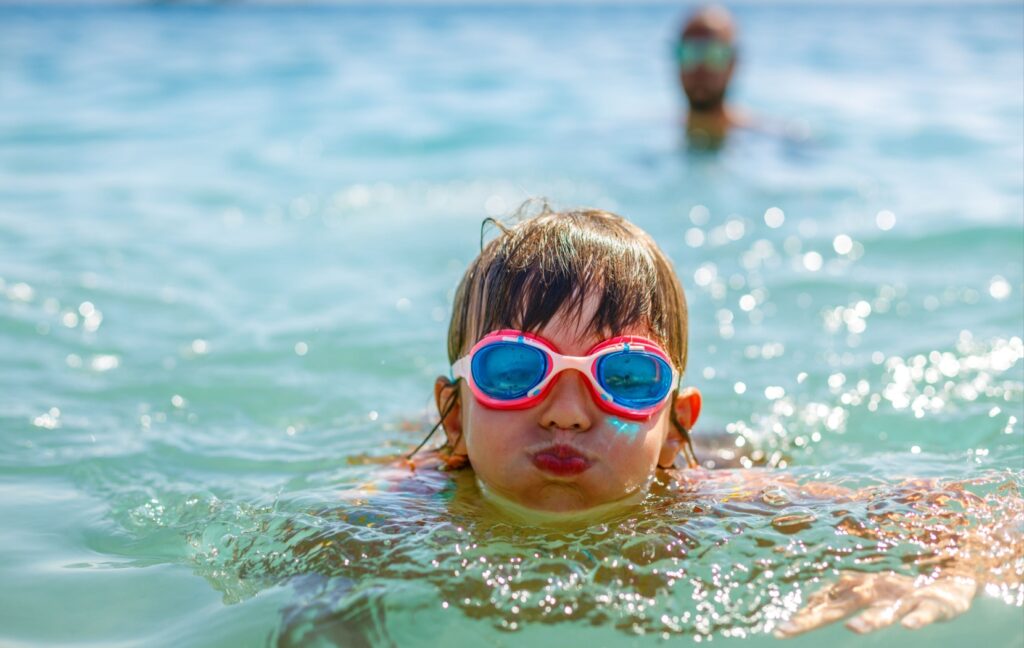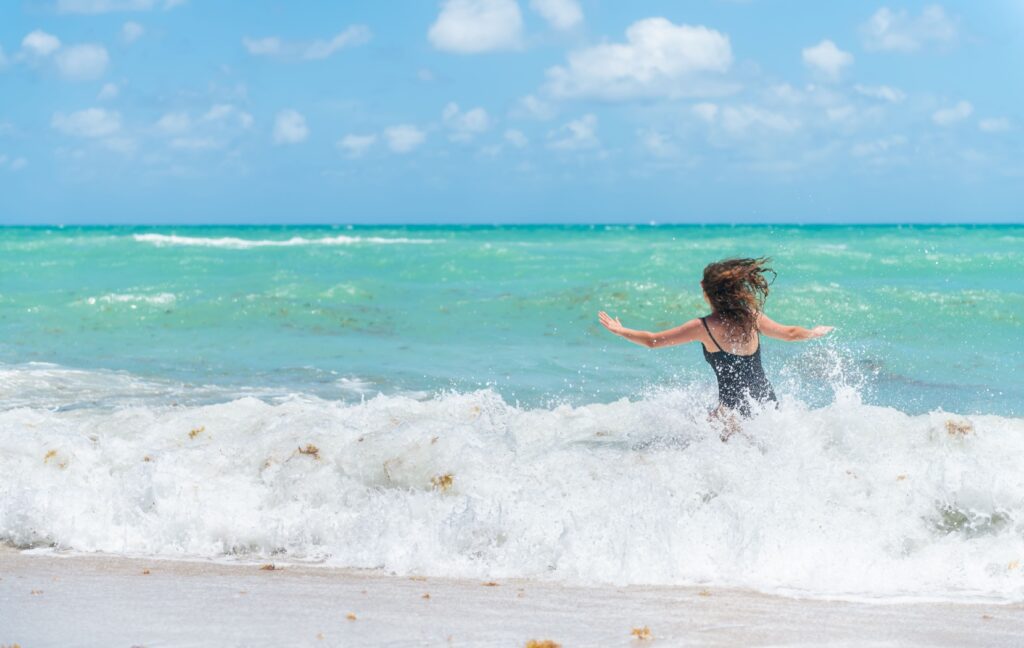Taking a dip in the ocean with your contact lenses in might seem harmless, but it’s not without serious risks. So, can you wear contacts in the ocean? Technically, yes—but it’s strongly discouraged.
Ocean water contains bacteria, viruses, and microscopic parasites that can get trapped under your lenses, leading to painful and potentially sight-threatening infections. There’s also the chance of losing your lenses to waves or irritating your eyes with salt, sand, and pollutants. Luckily, there are alternatives, so you can still enjoy swimming this summer.
Risks of Wearing Contacts in the Ocean
While it might seem convenient to keep your lenses in during a swim, there are significant risks involved. Ocean water is not sterile, and exposing your contact lenses to it can lead to serious eye issues. Here’s why:
Increased Risk of Eye Infection
Ocean water contains a variety of microorganisms, including bacteria, viruses, and parasites like Acanthamoeba. This organism can stick to your contact lenses and cause a severe eye infection called Acanthamoeba keratitis. This condition is rare but incredibly painful and could result in vision loss if not treated promptly.
Some studies found that contact lens users are significantly more likely to develop Acanthamoeba keratitis compared to non-contact lens wearers. This is because lenses act like sponges, trapping harmful microorganisms and holding them directly against the cornea.
Loss or Displacement of Contact Lenses
Swimming in the ocean can easily lead to losing your contact lenses. Abrupt waves, strong currents, or underwater activities can cause lenses to shift, fall out, or even get washed away entirely. Losing a lens is inconvenient, but attempting to retrieve it in an uncontrolled environment can lead to contamination or damage to your eyes.
Exposure to Irritating Substances
Besides microorganisms, ocean water contains salt, sand, and various pollutants. Salt can irritate your eyes, making them feel dry and uncomfortable, while sand particles can get stuck between your lenses and your eyes, causing scratches or abrasions on the cornea.
These risks highlight why contact lenses and ocean water don’t mix well. But if contacts are a necessity for you, don’t worry—we’ve got you covered with some safer alternatives and best practices.

Best Practices for Swimmers Who Wear Contacts
If you prefer or need to wear contact lenses while hitting the beach, following these recommendations can help protect your eyes and maintain hygiene.
Opt for Daily Disposable Lenses
If swimming with contacts cannot be avoided, daily disposable lenses are your safest option. These lenses are designed for single-use, so you can discard them immediately after swimming, reducing the risk of prolonged exposure to contaminants. However, remember to switch to a fresh pair of lenses after swimming to avoid potential infections.
Always Wear Swim Goggles
Pair your lenses with waterproof swim goggles to shield your eyes from contaminated water. A snug-fitting pair of goggles creates a barrier, preventing ocean water from coming into contact with your lenses. Make sure to choose goggles that offer a secure seal for maximum protection.
Remove & Rinse Your Contacts Post-Swim
If your contacts are exposed to ocean water, remove them as soon as possible. Use a sterile saline solution or contact lens cleaning solution to rinse them before reinserting or discarding them, depending on the type of contacts you use. Never rinse your lenses with water from the ocean or a tap, as this could lead to contamination.
Avoid Touching Your Eyes with Unclean Hands
Beach days are synonymous with sunscreen, sand, and sweaty hands—not the most hygienic combination. If you need to adjust or remove your contacts, make sure your hands are clean and dry to avoid transferring dirt or bacteria into your eyes.
Better Alternatives to Wearing Contacts in the Ocean
Some options can eliminate the risks while still allowing you to enjoy crystal-clear vision during your time in the ocean.
Prescription Swim Goggles
Invest in a pair of prescription swim goggles if you frequently swim or enjoy water sports. These specialized goggles correct your vision without requiring you to wear lenses while providing complete protection from water exposure. Many brands offer affordable and customizable options to suit your prescription needs.
Consider LASIK or Other Vision Correction
If you’re looking for a more permanent solution, you might want to consider undergoing LASIK or another vision correction procedure. LASIK eliminates your need for lenses or glasses, allowing you to swim worry-free. Speak to your eye care provider to learn if you’re a suitable candidate.
Wear Glasses When Not Swimming
If you’re spending your beach day mostly lounging onshore, consider leaving your contacts at home and wearing glasses instead. Simply remove them before taking a dip, and put them back on when you’re out of the water. While this won’t help you underwater, it’s a low-risk option for those not planning to swim extensively.
Enjoy Safe & Healthy Beach Days
When it comes to wearing contacts in the ocean, caution is key. The risks of eye infections, lens loss, and irritation outweigh the convenience of wearing contacts while swimming. However, by following best practices like using daily disposables, wearing swim goggles, and opting for eye-safe alternatives, you can enjoy your beach adventures without putting your vision at risk.
If you’re interested in exploring contact lens options, prescription swim goggles, or LASIK, our team of eye care specialists at Griffin Optometric Group is here to help. Schedule an appointment to help your eyes stay safe and healthy, no matter where your adventures take you.




